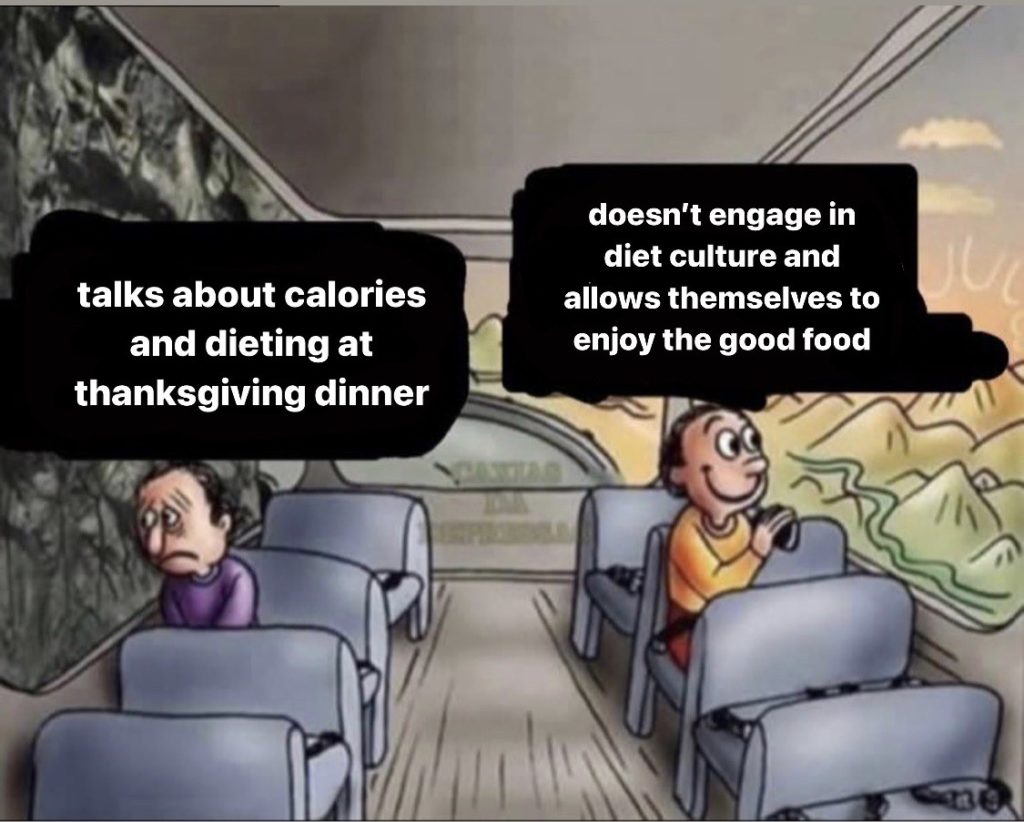CW: Eating Disorders
The holiday season has arrived, and while festivities may be long-awaited for some, it’s not always the most ‘wonderful time of the year’ for everyone. Many families center holiday celebrations around food, and for people who have a complex relationship with food, this can bring feelings of stress and anxiety rather than joy and excitement. It’s key to prepare ahead of time to safeguard your mental health and set boundaries both with yourself and those around you. For friends and families of someone with an eating disorder, you can also take steps to support your loved one.
Focus on what you bring to the table rather than what’s on it.
Pay attention to what matters to you this holiday season, like what you’re thankful for and your hopes for the New Year. If you have a break from work and are able to spend the holidays with family, take advantage of the opportunity to rest and connect with loved ones. You do not need to center the holiday around what you’re eating or what those around you are eating.
Communicate with family members.
If you’re comfortable doing so, express how this holiday season may be difficult for you, and share boundaries that may help you feel at ease during celebrations. For example, if your relationship with food currently prevents you from being comfortable cooking for others, let your loved ones know, and ask if you can contribute to the event in another way. Expressing your boundaries ahead of time may help prevent avoidable and potentially triggering situations.
Don’t judge anyone’s body or appearance.
With vaccines now widely available and reduced travel restrictions in place, this may be the first time you’ve seen family members or other loved ones since before quarantine. It is completely normal for bodies to change over time, especially in the midst of a pandemic where routines were enormously altered. Avoid making any weight or body-related remarks.
Avoid talking about diets or calories at the table.
Diet culture can feel inescapable during the holiday season, from weight-loss goals for New Year’s resolutions to talks of new diets at dinner, and more. Many people have experienced the random cousin or aunt that talks about their weight loss goals or fad diet at the dinner table, possibly pointing out all the foods they’re not eating because of it. Eating disorders can be competitive, and this may trigger eating disorder related behaviors or thoughts, such as believing that you also cannot eat certain foods. However, know that other’s choices around food have no impact on your own body or appearance. Everyone could eat and work out the same amount every day, yet we all have different bodies. You are allowed to eat freely, even in the face of others who may not be doing so. If you’re the person talking about diets or calories at the table, just stop! There are other topics to discuss that won’t hurt those around you.
Practice intuitive eating.
Honor your hunger! Eat what looks appetizing to you, and portion what feels right. Don’t be afraid to go back for seconds, even if others at the table are not. Sometimes, it can feel like there’s too many good food options to choose from! For some people, this may result in feeling the need to overeat to take it all in. Though it may feel that way in the moment, it is not the last time those foods will be available to you. Listen to your hunger cues, including when you’re full. Doing so may help prevent feelings of guilt or physical discomfort from extreme fullness. If you do “overeat”, it’s not the end of the world.
Remember that every day starts brand new.
The surplus of food available during holiday meals can be overwhelming, and you should allow yourself to join them to the extent of which you’re comfortable doing so. However, when struggling with an eating disorder, a person may experience feelings of guilt after eating, especially after indulging in foods they don’t eat on a regular basis. Remember that each morning starts a new day, and not to “compensate” for a bigger meal you may have had the day before, like by eating less or engaging in other eating disorder behaviors. Fullness is temporary, and a normal response to eating a meal (even without overeating!). You do not need to punish yourself for feeling full, and it is okay to eat regularly afterwards.
And when all else fails, make memes.
Be the guy by the window. Don’t be the guy who talks about calories and dieting at holiday parties. We love the guy by the window!

Yes, I made this. And yes, there is a chance I share it with my family before Thanksgiving.
If you’re struggling with an eating disorder, you’re not alone. Don’t hesitate to reach out for help. The National Eating Disorder Association (NEDA) provides support over call, text, or chat.
Comments
0